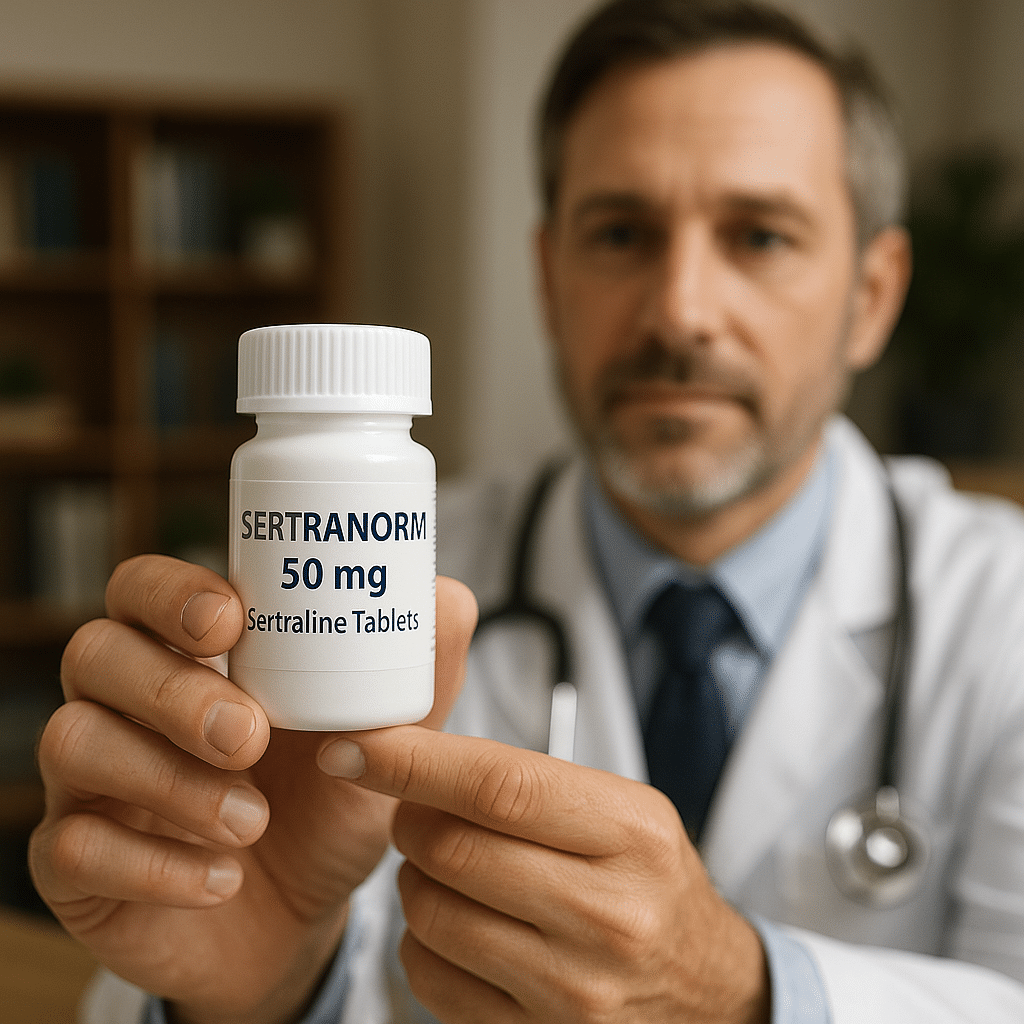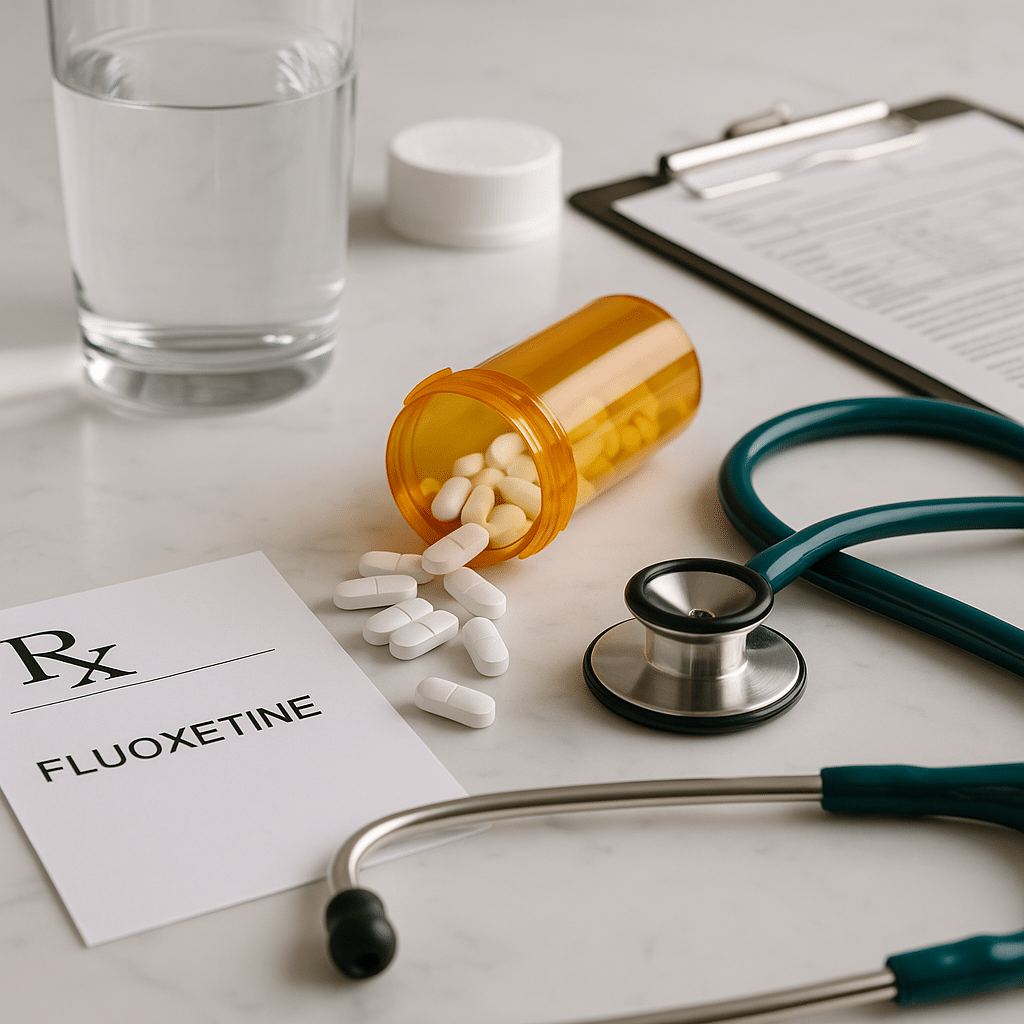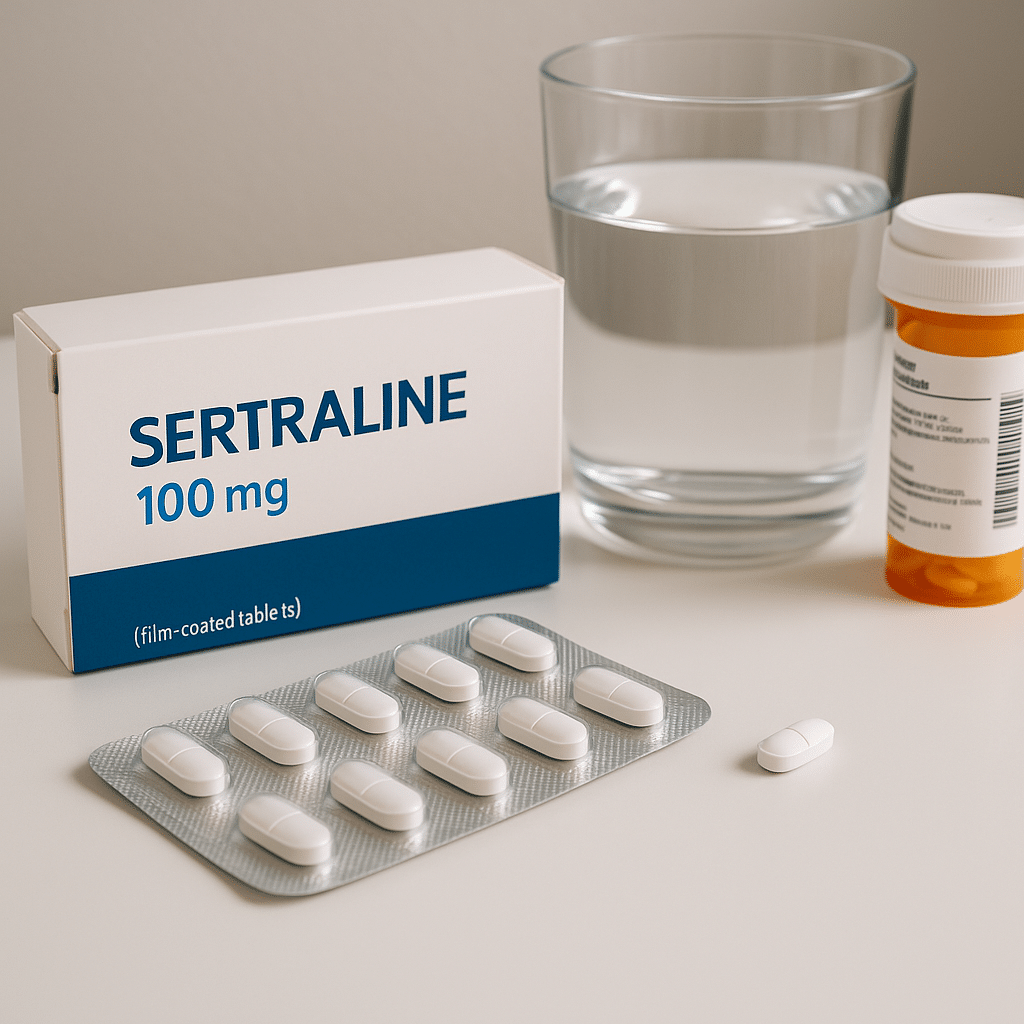Table of Contents
Key Takeaways
- Sertraline (Sertranorm) is an SSRI, and most early side effects are mild and time‑limited. Understanding how the medication works helps set realistic expectations and reduces anxiety about common symptoms.
- Know the core list of 11 side effects before you start or change a dose. Being able to name them makes it easier to track patterns and discuss concerns with your prescriber.
- Nausea is common in the first weeks and often improves with food and hydration. If vomiting persists or leads to weight loss, contact your prescriber.
- Sleep can shift in either direction—insomnia or daytime sleepiness—so timing and routine matter. Ask your prescriber whether morning or evening dosing is best for you.
- Sexual side effects (lower libido, delayed orgasm) are possible and should be discussed openly. Dose changes, timing strategies, or alternative options may help.
- Learn the red flags that need urgent care: serotonin syndrome, unusual bleeding, severe jaundice, or seizures. Share a full medication and supplement list with your prescriber to reduce risk.
- Many everyday effects fade in ~2–4 weeks; benefits may take 4–8 weeks. Keep a brief symptom journal and maintain consistent dosing to support adjustment.
- Risk is higher with certain factors—age under 25, multiple medications, and specific medical conditions. Close monitoring early in treatment makes a difference.
- Avoid using alcohol or drugs to “take the edge off” side effects; a medically supervised detox is the safest path if use has escalated. Briarwood Detox Center in Austin provides 24/7 medical monitoring and coordinated next‑step care. Call our admissions team today at (888) 857-0557.
- Do not stop sertraline suddenly—taper with your prescriber’s guidance. If alcohol or other substances are involved, complete detox first so your mental‑health plan can proceed safely.
- If you’re searching for treatment in Austin, TX, Briarwood offers licensed, medically supervised detox with same‑day admissions. We verify insurance quickly and plan your transition to ongoing care.
Break Free from Addiction. Detox Safely in Austin Today.
Medically Supervised Detox – Compassionate Care Starts Here.





















What sertraline (Sertranorm) is—and why side effects occur
The 11 side effects you should know about
1) Nausea
2) Diarrhea or indigestion
3) Dry mouth
4) Sleep changes (insomnia or daytime sleepiness)
5) Fatigue or tiredness
6) Sexual side effects
7) Tremor or restlessness
8) Increased sweating
9) Headache or dizziness
10) Minor weight changes
11) Suicidal thoughts or behavior (boxed warning)
Antidepressants carry a boxed warning for increased risk of suicidal thinking and behavior in people up to age 24—especially in the first months or after dose changes. In FDA analyses, the average risk of such events was about 4% on drug vs 2% on placebo. Report new or worsening mood symptoms immediately.
Serious but uncommon reactions—seek urgent care
Serotonin syndrome
Increased bleeding risk
Liver problems
Seizures
How long side effects last—and what helps
Many early effects (nausea, diarrhea, dry mouth, sleep changes) improve within ~2–4 weeks as your body adjusts; full symptom relief from sertraline can take 4–8 weeks. Helpful habits include: take the dose at the same time daily; take with food if advised; limit alcohol; keep a brief symptom journal for your follow‑ups.
Who is more likely to have side effects
- Age under 25: higher risk for suicidal thoughts/behavior early in treatment or after dose changes—ask family or trusted supports to help watch for mood or behavior shifts.
- Polypharmacy: sertraline interacts with MAOIs, linezolid, triptans, some pain medicines, St. John’s wort, anticoagulants, and NSAIDs; these combinations can raise risks. Share a full med/supplement list with your prescriber.
- Medical conditions: liver disease, seizure disorders, or bleeding conditions call for added caution and closer monitoring.
Break Free from Addiction. Detox Safely in Austin Today.
Medically Supervised Detox – Compassionate Care Starts Here.
Sertraline, Sertranorm, and substance use: a detox‑first perspective in Austin, TX
Using alcohol or other drugs to “take the edge off” sertraline side effects can worsen sleep, increase dizziness, raise bleeding risk, and mask mood shifts that need medical review. If side effects have led to heavier alcohol or drug use, a medically supervised detox may be the safest first step so your mental‑health plan can work as intended—explore substance abuse treatment Austin TX at Briarwood Detox Center.
Considering treatment locally in Austin, TX
If you’re searching for substance abuse treatment Austin TX, comparing austin drug treatment centers, or looking up drug treatment centers in Austin, Texas, Briarwood Detox Center provides licensed, medically supervised detox to help you stabilize safely and transition into ongoing care. We offer same‑day admissions and fast insurance verification through our Austin program:
Stopping sertraline (Sertranorm) safely
Do not stop sertraline suddenly. Tapering under prescriber guidance reduces the chance of discontinuation symptoms such as dizziness, flu‑like feelings, and sleep changes. If alcohol or benzodiazepines are part of daily coping, seek a supervised medical detox before making medication changes—here’s what to expect during detox.
How Briarwood Detox Center Helps With Sertraline (Sertranorm) in Austin, TX
Find Medically Supervised Detox Near You in Texas
Medical Disclaimer
Sertraline (Sertranorm) FAQs: Side Effects, Safety & Care in Austin, TX
What are the most common side effects of sertraline (Sertranorm)?
How long do sertraline side effects usually last?
How long does sertraline take to start working?
Can I drink alcohol while taking sertraline?
It’s safest to avoid alcohol; it can worsen side effects and reduce treatment response.
What should I do if I miss a dose of sertraline?
Skip the missed dose and take your next dose at the usual time—don’t double up. If you miss several doses, contact your healthcare professional.
What is serotonin syndrome and what symptoms should I watch for?
Serotonin syndrome is a rare reaction that can include agitation, diarrhea, fever, fast heart rate, high blood pressure, overactive reflexes, and confusion; seek urgent care if suspected.
Is 50 mg of sertraline a high dose?
Does sertraline cause sexual side effects?
Can I drink grapefruit juice with sertraline?
How should I stop sertraline (Sertranorm) safely?
Is Sertranorm the same medication as sertraline?
What if sertraline side effects have led me to use alcohol or other drugs to cope?
Can a detox program help me manage medications while I address substance use?
Related Blog Posts

Sertraline Side Effects: Common, Severe & Long‑Term

Prozac and Bipolar: What to Know

Zoloft & Bipolar: Side Effects and Fluoxetine Risks

How to Help Fight Substance Abuse in Austin

Beginner’s Guide to Drug Abuse Counseling in San Antonio

